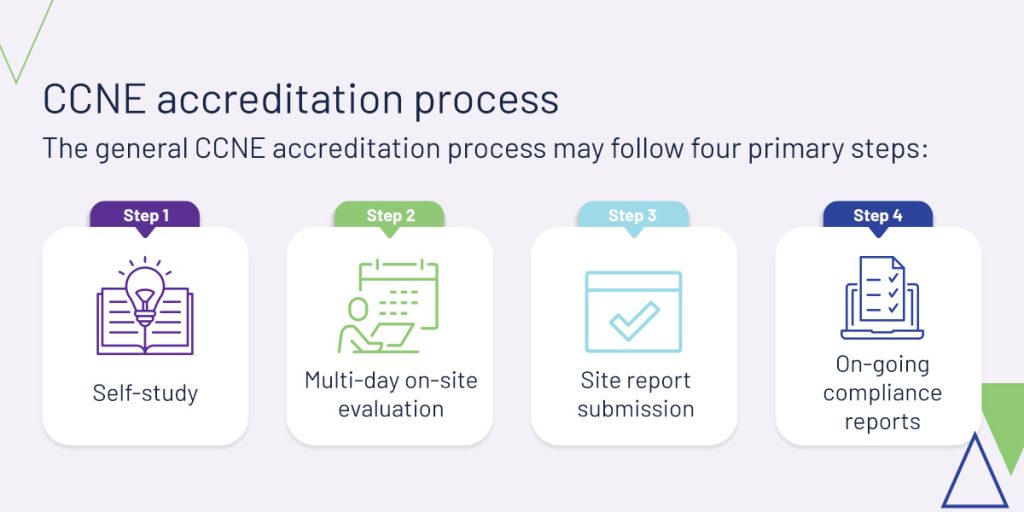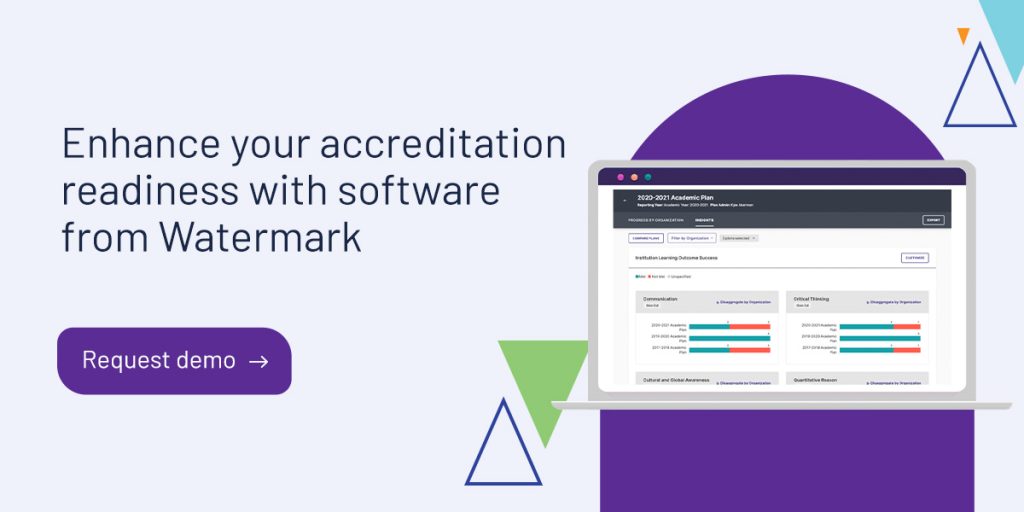Registered nurses perform various critical tasks in the medical field, from diagnostic tests to operating medical equipment. This makes it valuable for nurses to receive quality education from an accredited nursing program that offers them the extensive knowledge and confidence needed to perform well in a medical setting.
Learn about the value of the Commission on Collegiate Nursing Education (CCNE) accreditation for nursing programs, its quality standards, the accreditation process, and other accreditation process compliance tips for higher education institutions.
The Commission on Collegiate Nursing Education accreditation is a voluntary, self-regulatory process that establishes nursing program quality standards and criteria for certification of graduate, baccalaureate, and residency/fellowship programs. The commission’s goal is to accredit nursing programs that use effective educational practices and continuously work toward improvement.
As part of the American Association of Colleges of Nursing (AACN), which assesses nursing program quality and whether an institution meets expected outcomes, CCNE recognizes and evaluates Doctor of Nursing Practice, Master of Science in Nursing, Bachelor of Science in Nursing degrees, and post master’s nurse practitioner (NP) programs.
CCNE uses four accreditation standards to assess the quality of nursing programs. These focus on governance, student support, faculty, curriculum, and expected nursing program outcomes.
Higher education institutions with this accreditation should ensure the program’s goals, mission, and outcomes align with those of the parent institution, cater to the community’s needs, and reflect professional nursing standards. The standard also requires that the program’s faculty and students be involved in program governance and ongoing efforts to improve program quality.
This standard requires that the parent institution demonstrates an ongoing commitment to providing the CCNE-accredited program with necessary resources, such as faculty and staff, to support the nursing program and the achievement of its goals, mission, and expected program outcomes.
The curriculum of a CCNE-accredited program should align with the program’s goals, mission, and expected student outcomes, reflect professional nursing guidelines and standards, and meet community expectations. The teaching-learning practices used should also support the achievement of expected student outcomes.
This standard requires that the program demonstrate its effectiveness in fulfilling its goals and mission. The program should collect and use this data to foster continuous program improvement. Data collection may use a systematic process that includes comprehensive information, timelines, a review of expected and actual outcomes, and analysis.

The general CCNE accreditation process may follow four primary steps:
If you’re aiming to receive CCNE accreditation, there are various steps you can take to facilitate a smooth process and effectively showcase compliance. Here five valuable tips for preparing for CCNE on-site evaluation and effective data reporting.
Whether you’re hosting an evaluation for one or multiple nursing programs, a single comprehensive self-study document that addresses each CCNE accreditation standard can be helpful to the evaluation team and other CCNE reviewers. Here are some information your self-study document can include:
A virtual resource room is a virtual space in which the evaluation team has access to evaluation resource materials. The AACN recommends that this resource room includes any materials referenced in the self-study that are missing from the appendices and evidence of compliance. Some examples of these resources might include:
Institutions are typically responsible for reserving hotel rooms for each evaluation team member. Team members typically pay for these, and the CCNE reimburses them for the payment. When choosing a suitable hotel, it’s important to consider whether they will continue working at the hotel. For this reason, book rooms at a hotel with internet access and a meeting space for group work that is close to a business center with a printer. You may also provide the team with emergency contact information for a designated program representative.
The program should prepare the agenda for the on-site evaluation. As such, consider doing the following:
When reporting outcomes and improvement data, whether to receive accreditation or demonstrate ongoing compliance, it’s important to report specific and measurable indicators of achievement. For example, a statement could include:
Understanding CCNE accreditation standards can help you present and improve your nursing program, curricula, and educational practices to attract students seeking high-quality education and learning experiences. You can enhance your compliance with the CCNE accreditation process through accreditation solutions from Watermark.
Watermark’s accreditation readiness software may help you simplify and streamline the accreditation review and reporting process through programmatic and assessment data that is gathered and optimized into actionable insights. To get started, request a demo with us today.
